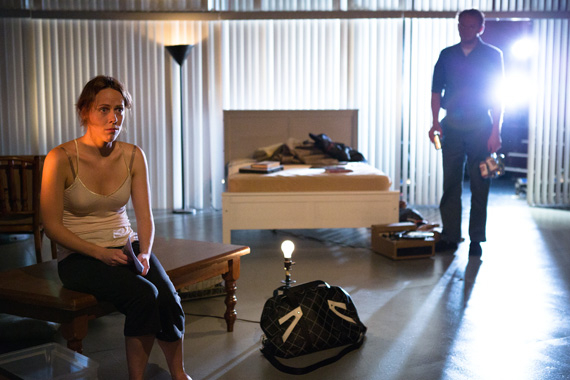feeling.

(© Hunter Canning)
Breakups suck, especially when they’re sprung on you unwillingly. How far would you go to get that special person to stay? Would you kill him? Jeffrey Dahmer would, but what about Emma? She’s the central character in Paul Cameron Hardy’s feeling., now making its world premiere at the New Ohio Theatre in a production by Glass Bandits Theater Company. Emma’s thinking really hard about it (and a lot of other things because she’s an academic and, you know, that’s what she does). You’ll probably think hard about a lot of disturbing things, too, days after you leave this daring and intelligent new play.
Emma (Meredith Burns) is something of a permanent graduate student at an American university. She’s supposed to be grading papers from the undergraduate section she’s teaching, and writing her dissertation on the orphan in post-industrial literature, but lately she’s mostly just lying in bed, crying, and taking snapshots of her tear-stained face for an art project. That’s because her boyfriend of nine years, Alex (Ben Mehl), has just walked out on her. Luckily her twinky gay little bro, Oliver (Carl Holder), has come to the rescue, bearing whiskey and Winnie-the-Pooh. Yet even amid the copious drinking and children’s literature, Emma can’t stop thinking about serial killer Jeffrey Dahmer (Luke Robertson), a new imaginary best friend who comes around and chats with her about life and love. Everybody’s really worried about Emma.
Hardy has written a deeply thoughtful and emotionally honest play. He has stripped the insufferably academic Emma down to her vulnerable cores without losing any of her intelligence. Emma might have fancier words to explain her loneliness, but it’s still a feeling she has to share with the rest of humanity, and no amount of education can change that. “I hate that you are a human being,” she tells Dahmer in one of their tête-à-têtes. “That there is no such thing as demons. That we share
the same emotions.”
Robertson is spot-on Dahmer, right down to his rural Ohio accent. He comes around with a six-pack of Milwaukee’s Best and offers Emma pithy advice like some cannibalistic guidance counselor. Burns is remarkably expressive as Emma. The slightest shift in her face tells more of a story about human desire and longing than hundreds of artfully crafted essays ever could. We sit and watch for several minutes as she listens to some depressing hipster music on vinyl and stares into the void. It is thrilling. All the actors do a fine job of making their characters round, believable, and likable. Even Robertson.
Much credit should go to director Eddie Prunoske for making this breakup play feel less like a painful march of the saddos and more like a train wreck, one from which you cannot look away. Erik T. Lawson’s grotesque sound design (the transitions are filled with what sounds like body parts being hacked apart and lips smacking) helps keep this train chugging along toward its painful, bloody conclusion.
Unfortunately, Hardy and Prunoske don’t allow themselves nor their actors enough time to live in the climax, which is a shame after doing so much difficult legwork. When Emma answers the door to her apartment holding a ridiculously large knife (for chopping carrots) and finds 19-year-old undergrad Ben (Quinn Meyers) on the other side, we know that that the stakes have been raised to a critical mass. Then it all suddenly sputters out and we are left with an anticlimax disguised as a chilling final moment. This sharply intelligent production has earned much more of a resolution than that.
Of course, there are plenty of explosive and head-spinning moments on the way to that unsatisfactory landing. Go and enjoy those, and bring a friend who won’t be creeped out by the whole premise. It’s worth it.











